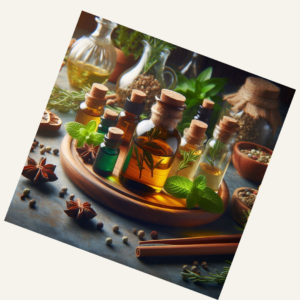MYRRH
Myrrh has been associated with mystical and mystical-like practices in various cultures and spiritual traditions. Here are some mystical uses and associations with myrrh:
Sacred Rituals:
Myrrh has been used in sacred and mystical rituals to invoke spiritual experiences, connect with higher realms, and facilitate communion with the divine.
Spiritual Protection:
Myrrh is sometimes employed to create protective barriers against negative energies, malevolent forces, or psychic attacks in mystical and occult practices.
Divination:
In certain mystical practices, myrrh is used to enhance divination methods, such as scrying or tarot card reading, by promoting clarity of vision and intuitive insights.
Astral Projection:
Myrrh is believed by some to aid in astral projection or out-of-body experiences, helping individuals explore other dimensions and realms beyond the physical.
Purification:
Mystics may use myrrh as a tool for purifying themselves, sacred objects, or ritual spaces before engaging in mystical activities or ceremonies.
Anointing:
Myrrh-infused oils or ointments are used to anoint the body or specific energy points (chakras) to align with higher frequencies and open channels for spiritual connection.
Offerings:
Myrrh resin is often considered a valuable and sacred offering to deities, spirits, or otherworldly entities in mystical practices as a gesture of reverence and to gain their favor.
Enhancing Psychic Abilities:
Some mystics believe that myrrh can heighten psychic abilities, such as clairvoyance, clairaudience, and clairsentience, aiding in the reception of mystical insights.
Inner Transformation:
Myrrh is associated with inner transformation and personal growth in mystical contexts, symbolizing the journey of the soul and the shedding of the ego.
Elevating Consciousness:
Mystics may use myrrh to elevate their consciousness, expand their awareness, and experience altered states of perception during meditation or trance states.
SKIN:
Chapped and cracked skin, wrinkles, wounds, mature skin, eczema, ringworm, weak gums and teeth
DIGESTIVE:
Painful and difficult digestion, gas, loss of appetite, hemorrhoids, ulcers
IMMUNE: colds, weak gums, sores and ulcers, wound healing
GENITO-URINARY:
Itching, thrush, painful and difficult menstruation.
CIRCULATION
tone of blood vessels (along with vetiver)
MUSCULAR/JOINTS:
Arthritis, effects opioid agonists which aids in pain management
RESPIRATORY:
Infection, sinus issues, mucus, asthma, coughs
ENDOCRINE
Glandular stimulant
NERVOUS SYSTEM:
Psychosomatic response, pain management, may be helpful in treatments for Alzheimer’s, Parkinson’s, Schizophrenia
PSYCHOLOGY:
Accepting oneself, stress reduction
ENERGETIC:
Purifying, energizing, soothing, regenerating, helps to synchronize chakras.
SPIRITUAL:
Clairvoyance, Helps to physicalize spiritual energy, increase conductivity to the Divine, helps to experience a higher sense of oneness, used in balancing Mother Nature and the Buddha Nature or Christ Consciousness
PLANETARY INFLUENCE
Myrrh is commonly associated with the planet Saturn. Here’s how myrrh is thought to be related to Saturn’s aspects:
Saturn:
Saturn is often associated with discipline, responsibility, structure, and transformation. Myrrh is believed to resonate with these qualities, making it an herb associated with Saturn. Here are some aspects of Saturn that myrrh may influence:
Grounding:
Saturn is considered a grounding influence, and myrrh is thought to have grounding properties, helping individuals connect with the material world and maintain stability.
Protection:
Saturn is associated with protective energies, and myrrh may be used to create a protective shield or ward off negative influences.
Purification:
Both Saturn and myrrh are associated with purification and cleansing. Myrrh can be used to purify spaces, objects, or individuals in esoteric practices.
Transformation:
Saturn is a planet of transformation and change, and myrrh is sometimes used in rituals related to personal transformation or letting go of the past.
Spiritual Growth:
Saturn’s influence is not only about discipline but also spiritual growth through challenges. Myrrh may be used to aid in spiritual development and self-reflection.
HISTORICAL:
Myrrh has a long and storied history that dates back thousands of years. Here is an overview of its historical significance and uses:
Ancient Egypt:
Myrrh was highly prized in ancient Egypt and was used in the embalming process for mummies. It was considered a symbol of death and rebirth and was often used in religious rituals and offerings to the gods. The Egyptians also used myrrh in cosmetics and perfumes.
Ancient Mesopotamia:
Myrrh was traded along the Silk Road and played a significant role in the trade routes of ancient Mesopotamia. It was used for medicinal purposes, as incense in religious ceremonies, and as an ingredient in cosmetics.
Biblical References:
Myrrh is mentioned numerous times in the Bible, particularly in the Old Testament. It is one of the gifts the Magi brought to the infant Jesus in the New Testament. Myrrh symbolizes the sacred and was used in anointing oils and holy incense.
Ancient Greece and Rome:
Myrrh was well-known in ancient Greece and Rome. It was used for medicinal purposes, as a fragrance in perfumes and cosmetics, and in religious rituals. The Greeks believed myrrh had healing properties and used it to treat various ailments.
Traditional Chinese Medicine:
Myrrh has been used in Traditional Chinese Medicine (TCM) for centuries. It is considered to have warming properties and is used to invigorate the blood, promote circulation, and relieve pain. It is often used in herbal formulas.
Ayurvedic Medicine:
Myrrh has a place in Ayurvedic medicine as well. It is used in various herbal preparations to treat conditions like arthritis, digestive issues, and respiratory problems. In Ayurveda, it is believed to have anti-inflammatory and antimicrobial properties.
Middle Eastern and African Use:
Myrrh has been used in Middle Eastern and African traditional medicine for its potential healing properties. It has been applied topically, used as incense, and taken internally for various purposes.
Medieval Europe:
Myrrh was imported to medieval Europe and was used for both medicinal and religious purposes. It was often a component of apothecary remedies.
Modern Uses:
Myrrh is still used today in traditional medicine systems, herbal remedies, aromatherapy, and as an ingredient in perfumes and cosmetics.
